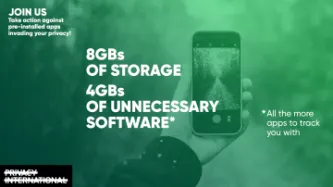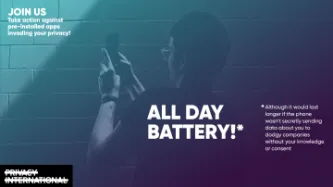Search
Content type: Advocacy
Privacy International welcomes the aim of the Cyber Resilience Act to bolster cybersecurity rules to ensure more secure hardware and software products. Nevertheless, we note that the proposal put forward by the European Commission contains certain shortcomings which could both hamper innovation and harm consumers who are increasingly relying on digital products and services.It is essential these shortcomings, detailed below, are effectively addressed by the EU co-legislators through the…
Content type: Report
Introduction
Several policy initiatives are in progress at the EU level. They seek to address the sustainability of connected devices such as smartphones, tablets and smart speakers. While initiatives to extend the useful life of hardware are important, software must not be ignored. Almost any digital device with which we interact today relies on software to function, which acts as a set of instructions that tells the hardware what to do. From smart thermostats to smart speakers, to our…
Content type: Advocacy
Our environment is increasingly populated by devices connected to the Internet, from computers and mobile phones to sound systems and TVs to fridges, kettles, toys, or domestic alarms. There has been research into the negative safety and privacy impacts of inadequate security provided by the software in such devices (such as the creation of large scale botnets). This is also the case with outdated security, a risk enabled by software support periods that are shorter than a product’s usable life…
Content type: News & Analysis
A new report by the UN Working Group on mercenaries analyses the impact of the use of private military and security services in immigration and border management on the rights of migrants, and highlights the responsibilities of private actors in human rights abuses as well as lack of oversight and, ultimately, of accountability of the system.
Governments worldwide have prioritised an approach to immigration that criminalises the act of migration and focuses on security.
Today, borders are not…
Content type: Advocacy
Privacy International (PI), Fundaciòn Datos Protegidos, Red en Defensa de los Derechos Digitales (R3D) and Statewatch responded to the call for submission of the UN Special Rapporteur on contemporary forms of racism, xenophobia and related intolerance on how digital technologies deployed in the context of border enforcement and administration reproduce, reinforce, and compound racial discrimination.
This submission provides information on specific digital technologies in service of border…
Content type: Case Study
There are 29.4 million refugees and asylum seekers across the globe today. These are people who have fled their countries due to conflict, violence or persecution seeking protection in safer environments.
People have protected those in need fleeing from dire situations since antiquity. However, over recent years, European countries have become increasingly hostile towards refugees - treating them as criminals instead of people in need.
In 2017, German authorities passed a…
Content type: Case Study
Anyone who is arrested should be informed of the reasons for their arrest and any charges against them. Anyone who is detained is also entitled to a trial within a reasonable time, or to be released if no charges are held against them.
Privacy enhances these protections. It provides limitations on the manner in which information can be obtained about you, and the kind of information that can be accessed about you by law enforcement, who can access that information and how they can use it.…
Content type: Advocacy
Puede encontrar la carta a continuación. Agregue su voz a esta campaña firmando nuestra petición si cree que es hora de que Google deje de permitir la explotación.
Nota: Esta carta también está disponible en francés e inglés.
Estimado Sr. Pichai,
Nosotros, los firmantes, estamos de acuerdo con usted: la privacidad no puede ser un lujo reservado para las personas que tienen la capacidad de pagar por ella.
Sin embargo, los socios de Android Partner –que utilizan la marca y la imagen de…
Content type: Advocacy
You can find the letter below. Add your voice to this campaign by signing our petition if you believe that its time Google stopped enabling exploitation.
Note: This letter is also available in French and Spanish
Dear Mr. Pichai,
We, the undersigned, agree with you: privacy cannot be a luxury offered only to those people who can afford it.
And yet, Android Partners - who use the Android trademark and branding - are manufacturing devices that contain pre-installed apps that cannot be deleted…
Content type: Advocacy
Vous pouvez trouver la lettre ci-dessous. Ajoutez votre voix à cette campagne en signant notre pétition si vous pensez qu'il est temps que Google cesse d'activer l'exploitation.
Ce contenu est également disponible en anglais et en espagnol.
Cher M. Pichai,
Nous, les organisations signataires, sommes d’accord avec vous :
la vie privée n’est pas un luxe, offert seulement à ceux qui en ont les moyens.
Pourtant, les « Android Partners » – qui utilisent la marque déposée…







